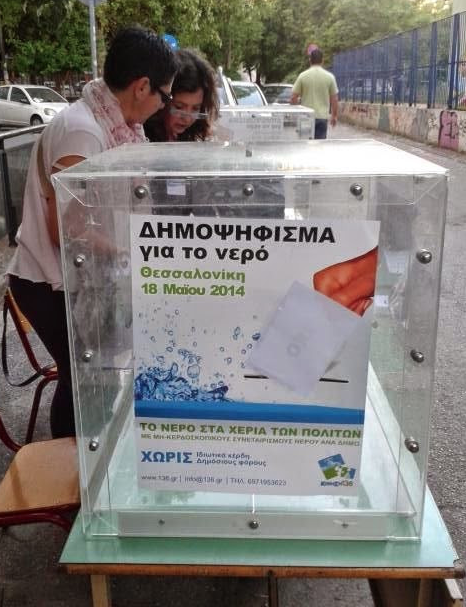Citizens Won: Greek Water Remains in Public Hands
There is an ongoing struggle in southern Europe, where water privatization is promoted as a way out of the economic crisis. But this summer, a turnaround victory was achieved in Greece: the Council of State ruled against the privatization of Greek public water companies. Citizens have shown, again, that privatization can be defeated through a combination of grassroots mobilization, legal actions and international solidarity.

Credit: Save Greek Water
There is an ongoing struggle in southern Europe, where water privatisation is promoted as a way out of the economic crisis. But this summer, a turnaround victory was achieved in Greece: the Council of State ruled against the privatisation of Greek public water companies. Citizens have shown, again, that privatisation can be defeated through a combination of grassroots mobilisation, legal actions and international solidarity.
The story goes back some years ago. Under conditions imposed by the Troika (which includes the International Monetary Fund, the European Commission and the European Central Bank) to reduce Greece’s debt, public water companies in Athens and Thessaloniki were about to be privatised by the government, among other painful and socially unfair measures.
The mobilisation against this measure was massive, and great campaigns were launched in Athens, with a great success in media, and Thessaloniki, where a popular referendum showed an overwhelming opposition to water privatisation. A solidarity effort was coordinated by the European Water Movement (Food & Water Europe is an active member). Over 130 civil society organisations and trade unions teamed up with 50 members of the European Parliament to send a letter to the bidders of the public water company in Thessaloniki urging them to drop their bid. Those companies included French multinational Suez Environnement and Israeli group Mekorot. The situation in Greece was central in the campaign for the European Citizen’s Initiative that collected nearly 1.9 million signatures to support the human right to water and to stop liberalisation in the water sector.
This victory in Greece sends a clear signal to the European Commission and to the transnational water companies that were trying to make profit out of Greek crisis. The myth that people cannot resist against the Troika’s demands has collapsed. And as our colleagues from Save Greek Water say: “we can all, without exceptions, feel proud of this major victory.”
While we definitely celebrate this new major step to stop water privatisation in Europe, we are aware that we cannot be naïve. Public water management is still under threat in Greece and the rest of Europe as long as the European Union and the U.S. negotiate a new free trade agreement (known as TTIP or TAFTA), as long as the Troika pushes for water privatisation in many other countries, and as long as the European Commission goes on with their liberalisation agenda. These threats will require renewed mobilisation for the recognition of water as a human right and a common good.


